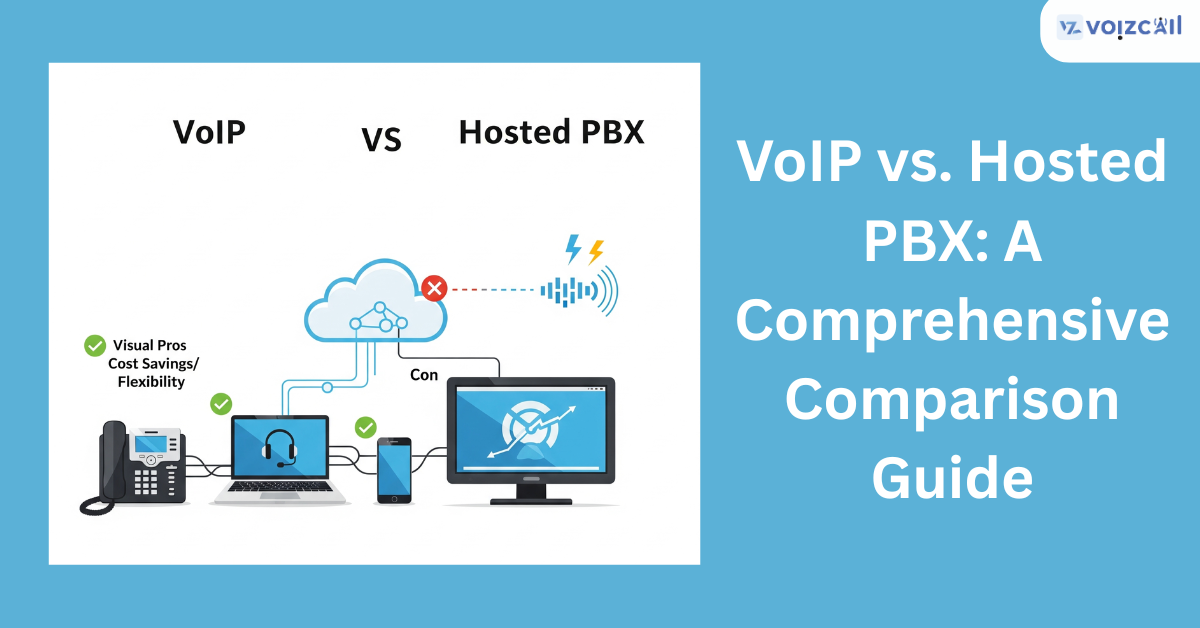


04/Aug/2025
In today's fast-paced digital era, efficient and cost-effective communication systems are crucial for any business. When exploring modern phone solutions, two popular options often come up: VoIP (Voice over Internet Protocol) and Hosted PBX (Private Branch Exchange).
But what’s the difference between the two? Which one is better for your business? Should you choose a full VoIP phone system or go with a cloud-hosted PBX solution?
This blog breaks it all down in a simple, easy-to-understand comparison. By the end, you’ll have a clear idea of which communication system best suits your business needs.
VoIP stands for Voice over Internet Protocol, a technology that allows you to make phone calls over the internet instead of traditional telephone lines.
Key Features of VoIP:
Internet-based voice calls
Typically used via softphones, mobile apps, or IP phones
Low-cost international calling
Easy to scale and flexible
Often used by startups, freelancers, and remote teams
Hosted PBX is a cloud-based phone system where the service provider hosts and manages the entire PBX infrastructure. PBX systems handle internal call routing, extensions, voicemail, call queues, and more.
Key Features of Hosted PBX:
Managed by a third-party provider in the cloud
Provides full PBX functionality without on-site hardware
Includes call routing, auto-attendant, voicemail, IVR, etc.
Ideal for growing businesses that need advanced features
Easy to add users or locations
VoIP vs Hosted PBX, Head to Head Comparison
Let us see how VoIP and Hospated PBX compare with one another in the most important categories:
Call / Email for Sales Inquiry Today
VoIP Hosted PBX
Call Management Basic (can vary by carrier) Advanced features added
Setup Cost Low Only a bit higher, but low
Maintenance Self- or provider-based Provider-full management
Scalability Very scalable Scalable easily to locations
End-user Control A lot freer within the tech teams Easier to navigate administration
Best Suited For Freelancers, startupper companies SMB, multiple location based business
Advantages of VoIP
Inexpensive to set up, easy to create and train small teams as well as remote workers
And accessibility throughout the world through any internet capable devices
Modifiable using open-source such as Asterisk or FreeSWITCH
Low-end hardware needs
Advantages of hosted PBX
No headaches of maintenance- your service provider does this.
Features of an enterprise without an enterprise cost
Superb when there are several departments or locations in teams
Security and uptime assurances included in the building Incorporated
So Which to Choose?
Use VoIP when:
You are a small business, or a startup with simple call requirements
You want cheap calls without feature burden
You require elasticity to control/integrate systems yourself
Select Hosted PBX when:
Advanced call routing, IVR or auto attendants are what you require
Your department is growing rapidly among other offices
That is, you desire hands-off, provider-managed solution
Closing reflections: The Key to Choosing the Appropriate Communication System
VoIP and Hosted PBX provide both a modern, more economical alternative to existing phone lines. VoIP is excellent when it comes to smaller teams of a technically inclined type, and the need is for basic voice conversation via the internet. Hosted PBX however, provides you with a full feature call management that comes complete with zero infrastructure headaches- perfect solution to a growing enterprise.
In any case, the decision will be made depending on the size of your business, your technical capability and communication requirements.